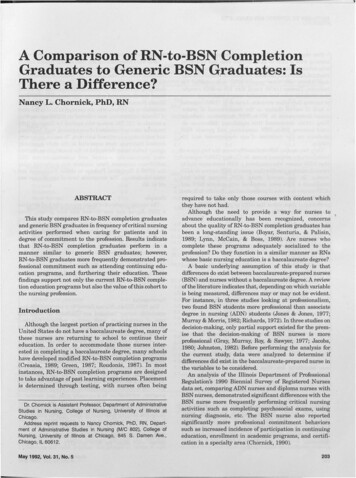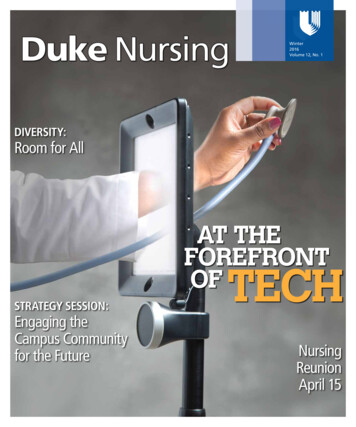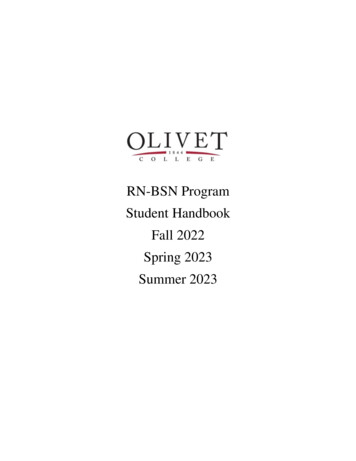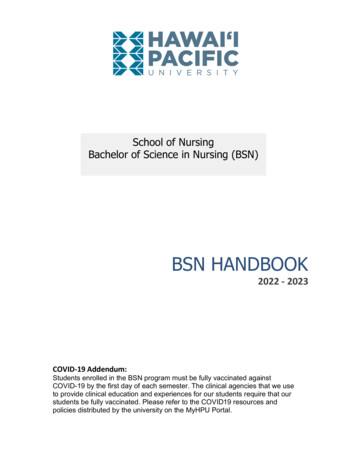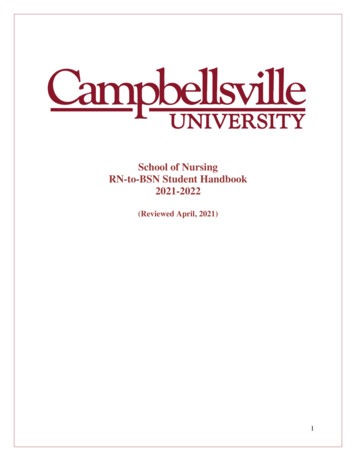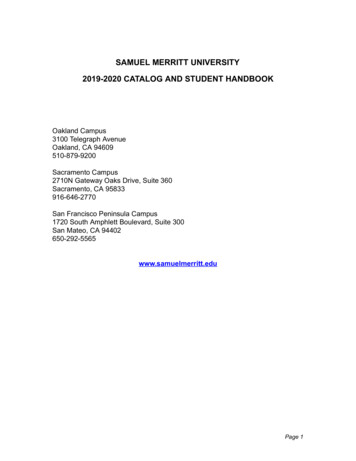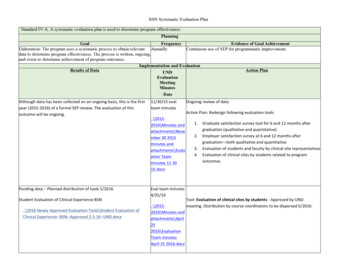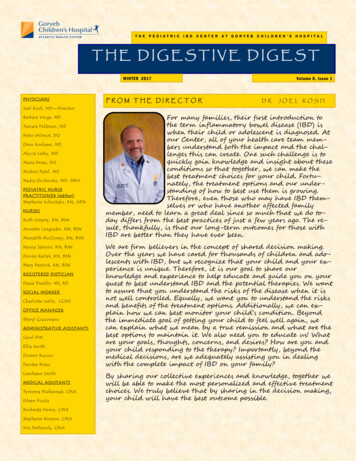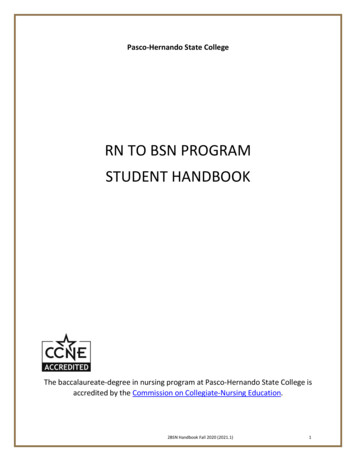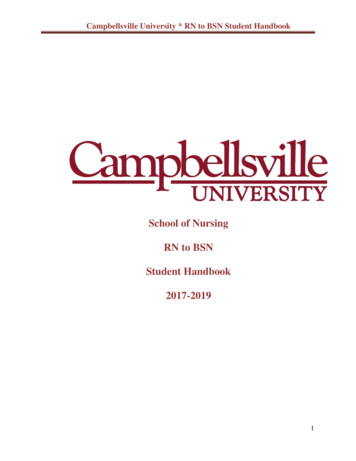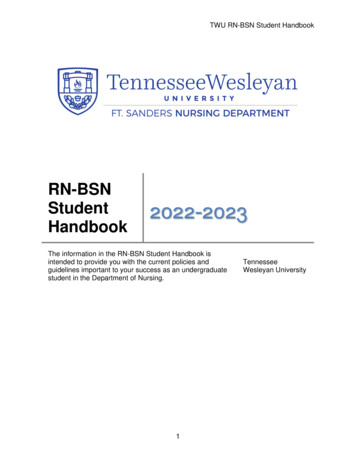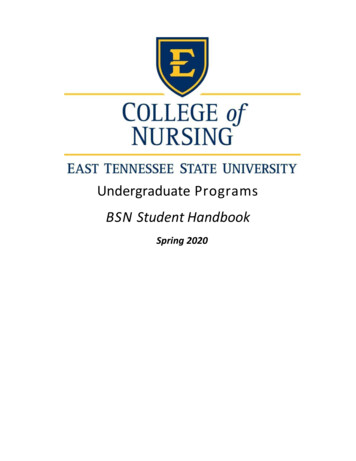
Transcription
Undergraduate ProgramsBSN Student HandbookSpring 2020
Celebrating over 60 Years of Excellence inBSN Education1954 – 2018PREFACEThe purpose of this student handbook is to assist you in understanding the policies, procedures, andgeneral information specific to your academic program within the College of Nursing at East Tennessee StateUniversity. The information in this guide is a supplement to, not a substitute for, information published inthe East Tennessee State University undergraduate catalog.Successful matriculation and graduation from an academic program requires adherence to all policies,procedures, and regulations as stipulated by both the College of Nursing and the university. If youhave any questions regarding requirements or policies, do not hesitate to refer them to your academicadvisor, program director, associate dean, or other appropriate persons.This handbook presents the policies, procedures, and general information in effect at the time ofpublication. Students affected by any changes to this handbook will be notified in writing throughweb posting and/or class announcements. The current handbook will also be available online atwww.etsu.edu/nursing in the Undergraduate Programs section.This handbook is not intended to replace state contractual terms and does not constitute a contractbetween the student and the College of Nursing.East Tennessee State University is a is fully in accord with the belief that educational andemployment opportunities should be available to all eligible persons without regard toage, gender, color, race, religion, national origin, veteran status, disability, or sexualorientation.ii
Office of the DeanPO Box 70617Johnson City, Tennessee 37614(423) 439-7051Dear Nursing Students:Welcome to East Tennessee State University College of Nursing! We are truly pleased that you are now part ofour College and hope that your educational experience in nursing is filled with challenge, excitement, andaccomplishment. The mission of the College of Nursing is to facilitate the health of the community and, as astudent; you will be very involved in fulfilling this mission through your guided clinical experiences. We willwork with you in many ways to help you achieve your goals.This handbook is offered to help you to understand the policies and procedures in the College of Nursing. Wehope it answers many questions you may have about the resources available to you and the opportunitiesyou will have as a student.Please feel free to contact any college administrator, faculty, or staff member should you need assistanceor support. We are here to serve you. Best wishes for your academic success as you pursue your degree.Warmest Regards,Wendy M. Nehring, RN, PhD, FAAN, FAAIDDDean and ProfessorEast Tennessee State University, College of Nursing1
EAST TENNESSEE STATE UNIVERSITYCOLLEGE OF NURSINGLocated in Nicks Hall, 365 Stout Drive, Johnson City, TN 37614IMPORTANT PHONE NUMBERS & OFFICE INFORMATIONOffice of Student Services, Suite 230 .423-439-4578or.1-888-376-8773Fax Number.423-439-4522E-mail.nursing@etsu.eduHours: Monday - Friday 8:00 a.m. - 4:30 p.m.Office of the Dean, Room 3-310 .423-439-7051Graduate Programs, Room 2-206 .423-439-5626Undergraduate Programs, Room 2-263 . .423-439-4417Skills Lab (Practice Lab) Room 3-326 3-327 . 423-439-4063Learning Resource Center (Computer Lab), Room 3-346 .423-439-4546Testing Center, Room 2-264 .423-439-4262Center for Nursing Research, Room 1-104. . . . 423-439-4082Office of Practice, Room 1-143 . . 423-439-40772
COLLEGE OF NURSING PERSONNELOFFICE OF THE DEANWendy M. Nehring, RN, PhD, FAAN, FAAIDD, Dean of the College of NursingAs Dean, Dr. Nehring is responsible for the administration and leadership of the entire College of Nursing. Sheoversees the degree programs, nursing faculty, support staff, the college budget, and ensures that the overallcollege mission and goals are being achieved. Her office is located in Suite 3-310.Teresa Feltner, C.P.S., Office CoordinatorShelly Mangiacotti, Personnel CoordinatorKim Maturo, Information Research Tech IIASSOCIATE DEANSThe Associate Dean for Academic Programs is responsible for the overall development, coordination, andevaluation of the academic programs within the college.Dr. Myra Clark, PhD, MSN, FNP, RN is the Associate Dean for Graduate Programs.Dr. Myra Clark, PhD is the Interium Associate Dean for Nursing Research.Dr. Patti VanHook, PhD, RN, FNP, BC, FAAN is the Associate Dean for Practice & Community Partnership.Dr. Melessia D. Webb, EdD, MSN, RN is the Associate Dean for Undergraduate Programs.PROGRAM DIRECTORS/PROGRAM COORDINATORSProgram directors are responsible for the staffing, implementation, and evaluation of courses as well as theoverall leadership of faculty and staff within their respective programs.Ms. Michelle Littleton is the Senior Director for Undergraduate Programs.littletonm@etsu.edu423.439.4083Ms. Emma Hopson is the Director of Main Campus Traditional and Accelerated Programs.hopsoneh@etsu.edu423.439.7244Ms. Tabitha Quillen is the Director of Post Licensure Programs for Undergraduate Programs.Quillent@etsu.edu423.439.4521Ms. Mary Campbell is the Coordinator of RN to BSN Program.campbellmc@etsu.edu423.439.4092Ms. Kacie Hauldren is the Coordinator of the LPN to BSN Program.hauldren@etsu.edu423.439.5776Ms. Jessica Hudson is the Director of the ETSU-HVMC Cohort Program.hudsonjl@etsu.edu423.439.3973Dr. Cindy Phillips is the Director of the ETSU-Sevierville Cohort Program.Phillipscd2@etsu.edu1.865.429.89613
UNDERGRADUATE STAFFThe program Executive Aides arePat Fink, Rm. 2-262, 423-439-4058, finkp@etsu.eduVeronica Roberson, Rm. 2-263, 423-439-4552, robersonv@etsu.eduTerri Thomas, Rm. 2-300, 423-439-5414, thomastr@etsu.eduThe Undergraduate Programs Office Coordinator is Melanie Peters, Rm 2-287, 423-439-4417,petersmd@etsu.edu.Ms. Holly Mitchell is the Undergraduate Clinical Coordinator, Rm 2-303, 423.439.5085, mitchellk1@etsu.edu.Ms. Denise Boswer is the Testing Center Administrator, Rm 2-265, 423.439.4262, bowserd@etsu.eduReviewed and approved UP Facutly Meeting 01.13.204
OFFICE OF STUDENT SERVICESFor students, the Office of Student Services is a primary source of information and assistance in the college.Personnel in the Office of Student Services are responsible for all phases of the non-classroom College ofNursing experience, e.g., recruitment, academic advising, referrals to campus resources, assistance inprocessing university forms, and "just listening."Advisors are available to meet with students throughout the calendar year, Monday through Friday. The officephone number is 423-439-4578 or 1-888-37NURSE. Students are encouraged to make an appointment to meetwith an advisor, but "walk-ins" are welcomed on a first-come, first-serve basis.The Executive Aide for the Office of Student Services is Katherine McDonald, 423-439-7199 ormcdonaldke@etsu.edu.The Exective Aide for all Clinical Health Care Requirements tracking and questions is Susan Diddle,423.439.4052 or didddles@etsu.edu.Professional and support staff in the Office of Student Services are located in Nicks Hall, Suite 230 andinclude: Matt Johnson, MA, Academic Advisor, RN to BSN and LPN to BSN, johnsonm@etsu.eduMaria Grindstaff, Academic Advisor, Nursing Majors, grindstaffdm@etsu.eduMargaret Mahlin, Academic Advisor, ETSU-HVMC and ETSU-Severivolle Cohorts, mahlin@etsu.eduFrannie Miller, MA., Academic Advisor, HPNU Advisor, millerf@etsu.eduMs. Karen Hirst, Assistant Dean of Student Services, hirstk@etsu.eduCENTER FOR NURSING RESEARCHThis center is responsible for promoting, facilitating and monitoring research activities within the college.Professional and support staff in the center include: Myra Clark, PhD, Intrium Associate Dean for Research Yan Cao, MPH, PhD, Research and Evaluation Services CoordinatorOFFICE OF PRACTICEThis office is responsible for supporting the college’s practice network and the integration of teaching,research, and service in the College of Nursing's Faculty Practice Network. Professional and support staff inthe Office of Practice include: Patti VanHook, PhD, RN, FNP, BC, FAAN, Associate Dean of Practice Silas Tolan, MPH, Executive Director, Community Health Centers Lisa Bowen, Executive Aide Bambi Garland, Information Research Tech II Janice Jones, Business Coordinator Nancy Laws, Office Asistant Karen Bowers, Billing and Collections SpecialistLEARNING RESOURCESThe Learning Resource Center (LRC), located in Nicks Hall, Room 3-346, is the computer lab for College ofNursing students. The College of Nursing Testing Center provides services to promote nursingstudents’ academic success. The Skills Labs in Room 3-326 and 3-327 provide equipment and space forstudents to practice nursing skills. The Simulation Labs, located in Rooms 3-347 and 3-348, play a vital part of5
many nursing courses. Simulations (imitation of real-nursing practice processes) range from basic assessmentskills to higher-order thinking and decision making during life-threating scenarios (i.e. myocardial infarction,cerebral vascular accidents or respiratory arrest). Faculty work with learners to offer teaching and learningstrategies that meet the needs of different learning styles. More information on all these learning resourcescan be found in this handbook.ADDITIONAL SUPPORT STAFFPersonnel and support staff in the College of Nursing include: Testing Center: Denise Bowser, Information Research Tech l Sim Lab Coordinator: Carla Orsburn, BSN, RN Skills Lab Coordinator, Main Campus: Anette “Jill” Street Kennedy, BSN, RN Skills Lab Coordinator, Main Campus: Stephanie Coston, MSN, RN Skills Lab Coordinator, ETSU-HVMC Campus: Brittany Flanary Skills Lab Coordinator, Sevierville Campus: Simulation Lab Director: Dr. Patricia Stewart, RNReviewed and approved UP Facutly Meeting 01.13.206
HISTORY, VISION, MISSION, GOALS, VALUESANDB.S.N. PROGRAM OUTCOMES7
HISTORYEast Tennessee State University (ETSU)East Tennessee State University (ETSU), a state supported, comprehensive, regional university opened in1911. ETSU had been part of the Tennessee Board of Regents (TBR) University and Community CollegeSystem of Tennessee until March 24, 2017 when based on the Focus on College and University Success(FOCUS) Act of 2016, the universities in the TBR system became independent universities each under thegovernance of a Board of Trustees. The first meeting of the ETSU Board of Trustees (BOT) was held on March24, 2017. This change in governance was recognized and approved by the Commission on Colleges of theSouthern Association of Colleges and Schools (SACSCOC) in March 2017 (see letters in Appendix 1) and afocused site visit was held May 15-17, 2017. This change was also reported to CCNE and the Tennessee Boardof Nursing (see letters in Appendix2). A new 10-year strategic plan and budget model was approved by theBOT in March and June 2017 respectively.ETSU was originally designated as a Normal School and subsequently a State Teachers College in 1925, EastTennessee State College in 1943, and East Tennessee State University in 1963. Master’s degrees have beenoffered since 1951 and doctoral degrees since 1972. ETSU received its first SACSCOC accreditation in 1927and is currently accredited through 2023. The university has a Carnegie Classification of Doctoral/ResearchUniversity – Intensive.Located in the Appalachian Mountains of eastern Tennessee, ETSU and the surrounding region boast ofmountains, lakes, a nationally recognized storytelling center, historic towns, the Birthplace of Country Music,and a mix of cities and rural communities. The university embraces the regional setting and has formed activecommunity partnerships both to enhance its institutional effectiveness and to serve the region. The ETSUCenter for Appalachian Studies and Services opened as a state Center of Excellence in 1984; in 2009, the firstever Bachelor of Arts degree in Bluegrass, Old Time and Country Music was approved. Another uniqueprogram is the Gray Fossil Site and Museum which opened in 2007 after the discovery of a vast fossil depositthat dates back from 4.5 to 7 million years ago.The main campus of the university, consisting of over 300 acres, is in Johnson City, a community ofapproximately 65,000 residents, with branch campuses in Kingsport and Sevierville, a location in Elizabethton,and two primary sites for the Colleges of Medicine and Pharmacy at Mountain Home Veterans’ campus. Theuniversity offers over 100 undergraduate, graduate, and professional degree programs.Academic Health Sciences CenterIn 1988, the Colleges of Nursing, Medicine, and Public and Allied Health formed the Division of Health Affairs.In 2011, the Division was recognized as an Academic Health Sciences Center (AHSC) at ETSU. Currently theAHSC stands as the only major academic health sciences center between Nashville, Tennessee and Roanoke,Virginia. In 1991, the AHSC received 6 million from the W.K. Kellogg Foundation to improve health caredelivery in rural communities. Emphasis continues to be placed on the concept of interprofessional,community-based learning. Within the Academic Health Sciences Center (AHSC) new initiatives include anexpansion in interprofessional education (IPE) activities, an IPE pilot project, development of a universityInterprofessional Education and Research Committee (IPERC), development of an IPE Strategic Plan, andgroundbreaking for the Interprofessional Education and Research Center which will include increased spacefor simulation and standardized patient experiences and will open in Summer 2018.The Colleges in the AHSC include Clinical and Rehabilitative Health Sciences, Medicine, Nursing, Pharmacy,and Public Health. All degree programs in the AHSC, which are eligible for accreditation, have beenaccredited. The College of Medicine offers programs leading to the Doctor of Medicine as well as aninterdisciplinary program leading to the Master of Science and Doctor of Philosophy in Biomedical Science,with concentrations in Anatomy, Biochemistry, Microbiology, Pharmacology, Physiology, PharmaceuticalSciences, and Quantitative Biosciences. In the College of Clinical and Rehabilitative Health Sciences, studentmay pursue undergraduate degrees in Allied Health with concentrations in Allied Health Leadership,8
Cardiopulmonary Science, Radiography, Dental Hygiene, and Nutrition. Master’s degrees are available inAllied Health, Communicative Disorders with a concentration in Speech-Language Pathology, and ClinicalNutrition, and doctorates in Audiology and Physical Therapy. Approved in 2005, the College of Pharmacyoffers the Doctor of Pharmacy degree, dual degree options with the Doctor of Pharmacy and a Masters ofBusiness Administration or Masters of Public Health. The College of Public Health, the first accredited PublicHealth College in Tennessee, manages the Tennessee Institute of Public Health, a statewide public-privatepartnership created to improve the overall health status of Tennesseans. Students in the College of PublicHealth may select from Bachelor degree programs in Environmental Health, Health Sciences, and PublicHealth as well as master degrees in Public Health and Environmental Health and doctorate programs inCommunity Health, Epidemiology, and Environmental Health Sciences.College of NursingThe College of Nursing has its roots in the Memorial Hospital Program which began in 1911. In 1949,under the leadership of Miss Vesta Swartz, Director of Nursing and Education at the Hospital, and thehospital's nursing staff, the School of Nursing became formally affiliated with East Tennessee StateCollege. The Hospital’s nursing program was closed in 1954 after the Tennessee Council for Nursingrecommended the establishment of a Bachelor of Science in Nursing (B.S.N.) degree program at EastTennessee State College.The Associate of Applied Science (A.A.S.) in nursing degree program at East Tennessee State Universitywas established in 1967. Originally located in the Bristol area as a result of a pilot associate degreeprogram, the program moved to the East Tennessee State University (ETSU) campus in 1982.In June 1978, a plan for the reorganization of the university was approved by the Tennessee Board ofRegents and became effective in August 1978. Under the reorganizational plan, the departments ofassociate degree and bachelor degree programs were no longer under the administration of the Collegeof Health, but were under the newly formed School of Nursing (SON) and the direction of a newnursing dean.In 1988, the School of Nursing, along with the College of Medicine and the School of Public and AlliedHealth, became part of the Division of Health Sciences. In March 1989, the SON faculty plan for thereorganization of departments was approved by the Tennessee Board of Regents. The two programbased departments were reorganized into three departments. These three departments, ProfessionalRoles/Mental Health Nursing, Adult Nursing, and Family/Community Nursing, were developed to meetpresent and future needs of the SON in research, service, and teaching. Both the associate andbaccalaureate degree nursing programs operated within the new departmental structure. In 1993, theSchool of Nursing became the College of Nursing (CON) to better reflect the educational, service, andscholarship mission of the programs.In 1997, the College of Nursing implemented a new community-based baccalaureate-nursingcurriculum designed to better prepare B.S.N. graduates for practice in the changing health care deliverysystem. The B.S.N. curriculum was revised, again, in 2003, to meet the Tennessee Board of Regents’mandate to limit all baccalaureate degree programs to 120 credit hours. The most recent revision tothe baccalaureate curriculum was completed in spring 2014 and implemented in fall 2014 in order toupdate knowledge, quality, and safety standards and technology / informatics related information. Inresponse to national and state mandates to focus nursing education at the baccalaureate andgraduate levels, the college began to phase out its A.A.S. degree program in fall 1997. In that year, anevening/weekend option in the R.N.-B.S.N. program was first offered in Johnson City and in Greenevilleand Johnson City in 1998. The last group of associate degree students graduated in December 1999.The RN-BSN program was transitioned into an online program in fall 2006 with advising cohortsavailable in Johnson City, Kingsport, Bristol, Knoxville and Sevierville, TN. In 2009 the College ofNursing introduced the Dual Degree program with Walter’s State Community College. This option allowsan ADN student to enroll and begin ETSU nursing courses prior to graduating from the community college9
and ultimately completing their BSN in a shorter period. Currently there are Dual Degree programarrangements with six community colleges in east Tennessee.In fall 2014, the BSN program implemented a newly revised curriculum, which was fully implemented in fall2016 and includes improved integration of the Essentials of Baccalaureate Education for Professional NursingPractice and other professional standards.A newly format for the RN-BSN program was initiated in fall 2016.A seven-week term for the RN-BSN program was implemented in fall 2016, which allows for five terms acrossthe year. In fall 2016, the College of Nursing initiated of an accelerated BSN program at Wellmont HolstonValley Medical Center, an off-site location. A cohort accelerated BSN program was initiated in fall 2016 at alocation about 20 miles from the main campus to assist a health system to attract and hopefully recruit newnurses upon graduation due to their current nurse shortage.The Master of Science in Nursing (M.S.N.) degree program was approved by the Tennessee Board ofRegents and the Tennessee Higher Education Commission in 1990 and the first class was admitted infall 1991. The program is designed to prepare nurses for advanced practice; graduates are eligible totake a national certification examination in the specialty field for which they are prepared. The collegeoffered the Family, Adult, Gerontological, and Psychiatric Mental Health Nurse Practitioner specialtiesand a specialty in Nursing Administration. The ETSU onground MSN program graduated the finalstudents in 2013. This program was closed due to the national trend to offer the Doctor of NursingPractice (DNP) program as the terminal nursing clinical degree. In fall 2004, the College of Nursinginitiated the M.S.N. – Regents Online Degree Program (M.S.N. – RODP). This degree is offeredcollaboratively by ETSU and the five other universities under the auspices of the Tennessee Board ofRegents, including: Austin Peay State University; Middle Tennessee State University; Tennessee StateUniversity; Tennessee Technology University; and the University of Memphis. M.S.N. degreeconcentrations available include Nursing Education, Nursing Administration, Advanced Practice, andNursing Informatics.The MSN program was discontinued with the implementation of the DNP program in 2011. The last studentgraduated in 2014 and a letter was sent to CCNE in summer 2016. This delay in notification was due to theCON understanding that the Clinical Nurse Leader concentrations was still viable since the DNP proposalindicated that only the nurse practitioner MSN concentration would be deleted with the start of the DNPprogram. In 2016, the CON learned that the THEC had terminated the MSN program, thus the notice to CCNE.The CON continued to participate in the Tennessee eCampus, a separate MSN program administered by theTBR and accredited by the Accreditation Commission for Education in Nursing (ACEN) until August 2017,when due to the governance change, chose to restart the MSN solely at ETSU.The Post-Master's Certificate Program in Advanced Nursing Practice was approved by the TennesseeBoard of Regents and the Tennessee Higher Education Commission in 1995. This program is designedto prepare registered nurses who already have a master's degree in nursing for specialty practice asFamily, Adult, Gerontological, or Psychiatric Mental Health Nurse Practitioners. An 18-credit-hour,interdisciplinary Graduate Certificate in Health Care Management program was approved and initiatedin 1997. Courses in this program are co-listed and co-taught by faculty from the colleges of Nursing,Business and Technology, and Public & Allied Health. In fall 2001, a 22-credit-hour interdisciplinaryGraduate Certificate Program in Gerontology was approved and initiated. Faculty from the colleges ofNursing, Public & Allied Health, Business and Technology, Education, and Arts & Sciences teachcourses within this unique certificate program.The Doctor of Philosophy (Ph.D.) degree program had its beginning as a Doctor of Science in Nursing(D.S.N.) degree program, approved by the Tennessee Board of Regents in March 2001 and theTennessee Higher Education Commission in November 2001. The first class was admitted in summer2002. The College of Nursing received significant federal funding in July 2002 from the Division ofNursing, Department of Health and Human Services to implement the doctoral program. From theonset, the D.S.N. degree program was primarily a research degree, and in keeping with the national10
trend to designate research degrees as the Ph.D. and practice doctorates as Doctor of Nursing Practice,the D.S.N. degree designation was changed to a Ph.D. by the Tennessee Board of Regents, effectivefall 2007. In 2009 the program was converted to an online and blended format with 3 on groundintensive sessions per year. The program prepares students for careers as nurse scientists andemphasizes research that will improve the health of diverse population groups. In 2011, theCollege of Nursing introduced the DNP program, the second doctoral program in the college.This program is the first DNP program in the Tennessee Board of Regents system. Students can choosefrom the MSN-DNP or BSN-DNP options. Nurse practitioner concentrations exist in Family, Adult,Gerontological, and Psychiatric Mental Health. A fourth concentration in Executive Leadership is alsoavailable. The format of the program is online and blended with 3 on ground intensive sessions per year.The program prepares nursing leaders for practice and administrative roles.Changes in the DNP program included a post-DNP certificate program was approved in spring 2015.The B.S.N., M.S.N., and D.N.P. degree programs are all fully approved by the Tennessee Board of Nursingand accredited by the Commission on Collegiate Nursing Education (CCNE). The M.S.N. - Regents OnlineDegree Program is accredited by the Accreditation commission on Education in Nursing (ACEN).11
EAST TENNESSEE STATEUNIVERSITYCOLLEGE OF NURSINGVISIONTo be the best College of Nursing in the state and region, nationally recognized in improvinghealth through the innovation and integration of teaching, research, scholarship, creativeactivity, service, and practice.MISSIONThe mission of the College of Nursing is to facilitate the health of the community throughexcellence and innovation in nursing education, research, service, scholarship, and practice.GOALS Provide highest quality nursing education programs. Provide BSN, MSN, DNP, and PhD graduates to address nursing workforce needs.Provide culturally diverse and international opportunities for students andfaculty. Engage in faculty, staff, and /or student research and scholarly activities that improve health andadvance nursing knowledge. Deliver innovative health care in partnership with communities. Influence systems and policies, through professional leadership and collaboration, to improveindividual and community health. Engage in interprofessional education, research, service, scholarship, and health caredelivery.VALUESWe Value:Professional interactions that demonstrate caring, respect, and compassion for othersDiversity and inclusivity, embracing the full scope of human cultures, ethnicities, and identitiesExcellence in fulfilling the work of the college through collaboration and cooperationThe nursing profession’s global contributions to social justice and to the holistic health ofindividuals, families and communities Stewardship and accountability in the use of resources Innovative leadership modeled through effective shared governance principles Approved:CON Faculty Council 05/12/15, 08/18/17Reaffirmed:CON Faculty Council 08/18/1712
B.S.N. Program Purpose StatementThe Bachelor of Science in Nursing (BSN) degree is the foundation for professional practice. The BSNprogram prepares competent nurse generalists who demonstrate professional accountability whilecoordinating and delivering highest quality, compassionate nursing care. Professional nursing integratesnursing theory and research and synthesizes knowledge from the sciences and humanities in the provisionof safe and effective care. As integral members of multidisciplinary healthcare teams, BSN-preparednurses identify health needs and provide direct and indirect care for individuals and groups across diversespectrums of life and human experience. Professional nurses promote and restore health, reduce risk,optimize health outcomes, and preserve human dignity through the skilled application of patient careand information system technologies. Guided byclinical judgment; evidence-based practice; and globalperspectives; ethical principles of social justice and personal and professional integrity, BSN-preparednurses are prepared to contribute leadership roles in healthcare. Professional nurses demonstratealtruistic values, critical thinking, social awareness, advocacy, communications excellence,interprofessional collaboration, and life- long learning. Evidence-based practice, ethical reasoning, andrelationship-based care are used to direct culturally-relevant practice across multiple settings atindividual, group, and population levels.Approved by Undergraduate Programs 08/15/12Reviewed by Undergraduate Programs 01/17, 08/15/1813
B.S.N. PROGRAM OUTCOMESOn completion of the B.S.N. degree program, the graduate will be able to:1. Synthesize knowledge from humanities, arts and sciences to provide competent and caringnursing practice in a global society.2. Communicate effectively with health care consumers, colleagues and other members ofinterprofessional teams at local, regional, national and global levels.3. Synthesize data to make and evaluate decisions related to best nursing practice.4. Engage in safe health care practices with individuals, families, groups, and populations.5. Practice nursing in compliance with current legal, ethical, and professional standards reflectinga commitment to lifelong learning.6. Collaborate to promote health and prevent disease for individuals, families, groups, andpopulations.7. Apply research and health quality data to
Matt Johnson, MA, Academic Advisor, RN to BSN and LPN to BSN, johnsonm@etsu.edu Maria Grindstaff, Academic Advisor, Nursing Majors, grindstaffdm@etsu.edu . East Tennessee State University (ETSU), a state supported, comprehensive, regional university opened in 1911. ETSU had been part of the Tennessee Board of Regents (TBR) University and .
